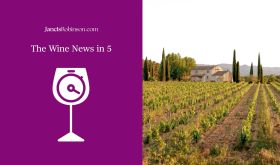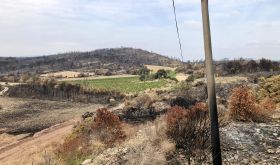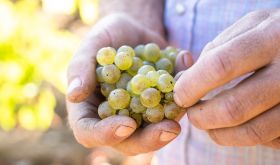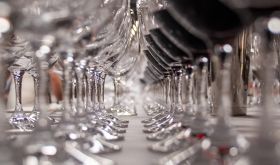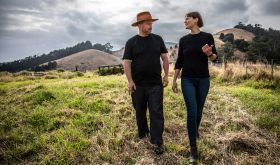Taylor’s Port Golden Vines Diversity Scholars 2024 announced
In 2021 Taylor’s Port, the Gérard Basset Foundation and Liquid Icons joined forces to offer financial support, guidance, mentorship and internship opportunities to individuals interested in undertaking the MW (Master of Wine) and MS (Master Sommelier) programmes who come from backgrounds that are not well represented in the wine industry. The scholarships are worth up to £55,000 each and are awarded on the basis of, and I quote, ‘ability, determination to succeed, financial needs, and their potential contribution to promoting diversity, inclusion, excellence, interaction and learning in the global wine community.’
On 6 June of this year JancisRobinson.com began publishing profiles of the 12 most promising candidates who applied this year. They are all hugely impressive individuals, and I encourage you to go read those profiles.
This week, they announced the winners: Bento Amaral from Portugal, Flavia Rizzuto from Argentina, Kanchan Schindlauer from the US and Emiliano Stratico from Argentina.
In addition, the judges awarded MW bursaries to cover course fees for the next year to Karene Vilela in Brazil and Xeniya Volosnikova from Kazakhstan (whose name might be familiar to some of you from the essay she wrote for our 2022 Wine Writing Competition).
Congratulations to all of the recipients!
Fires in northern Portugal
On Tuesday 17 September, the BBC reported that 10,000 hectares (37 sq miles) between the cities of Porto and Aveiro in northern Portugal had burned, at least seven people had died, and at least a dozen houses had been destroyed.
This burn zone overlaps with the winegrowing regions of Vinho Verde, Lafões, Bairrada and Dão. On 20 September Meininger’s reported that the estate vineyards for the Ladidadi label and for Tavares de Pina in the Dão, as well as a number of vineyards belonging to A&D Wines in Vinho Verde, had been partially lost to fires.
The fires seem to be largely under control at this point.
Tuscany’s flash floods
After last week’s news on Storm Boris bringing floods to Central and Eastern Europe, I had hoped not to be sharing news on any more flooding.
However … Italy 24 Press News reports that on 23 September, 226 mm (9 in) of rain fell in Bolgheri over the course of six hours. The president of Tuscany, Eugenio Giani, told the press that the region had never before recorded such a large amount of rain in such a short period of time. (Generally, the Bolgheri DOC receives 600 mm in the course of a year.) The resulting flash floods had run their course by the morning of 24 September. Fortunately, vineyard damage was minimal and, as 80–90% of grapes had already been brought in, the harvest escaped largely unscathed.
Oversupply woes in France and Spain
On 20 September, Radio France Internationale, RFI, reported that the French government had requested €120 million in financial aid from the European Commission in order to grub up 30,000 hectares (over 74,000 acres) of French vineyards, or around 4% of the country’s total planted acreage. The reason cited is falling consumption habits. Citing statistics from the French Observatory of Drugs and Addictive Tendencies, they reported than the habit of drinking wine daily with a meal has fallen by 70% over the last 60 years, and, according to France AgriMer, sales of wine in supermarkets have dropped by 15% in France in just the last three years.
Clearly, too many hectares of vines lead to excessive wine production, stocks go up, prices come down, and it becomes hard for farmers to make a living. To give growers a chance to recoup the costs of grubbing up and planting something new, the French government is hoping to entice growers with a €4,000 per hectare subsidy to permanently remove vines.
In a similar situation with oversupply, the Spanish wine industry is turning towards crisis distillation. Last month Just Drinks reported that the European Commission had granted Rioja crisis distillation aid. On 16 September, Decanter reported that the Galician government had authorised crisis distillation for Ribeira Sacra for the first time in history. They are now awaiting approval from the Spanish central government and the European Union. Growers in Ribeira Sacra maintain that the €2.4 million earmarked for distillation is insufficient and will result in a payout of less than €1 per litre – which will then be subject to tax.
Given this news, I have to wonder why anyone is 'investing' in planting new vineyards right now. Instead of clearing land and planting, I wish people would just go buy an existing vineyard – there are plenty! No need for new ones!
World’s first 100%-electric furnace for glass-bottle manufacturing
On 10 September, Verallia, the world’s third-largest glass-packaging manufacturer, began producing flint glass bottles with the world’s first 100%-electric furnace at its plant in Cognac. The new furnace represents a 60% reduction in CO2 emissions over gas furnaces.
While this technology is still eye-wateringly expensive – this furnace, capable of making 300,000 bottles a day, required a €57 million investment – it does mark a massive step forward in decarbonising glass-bottle production. Now, if only we could get people to reuse bottles …
This is a transcript of our weekly five-minute news broadcast, which you can watch below. You can also listen to it on The Wine News in 5 Podcast. If you enjoy this content and would like to see more like it, please subscribe to our site and our weekly newsletter. And if you have breaking news in your area, please email news@jancisrobinson.com.




